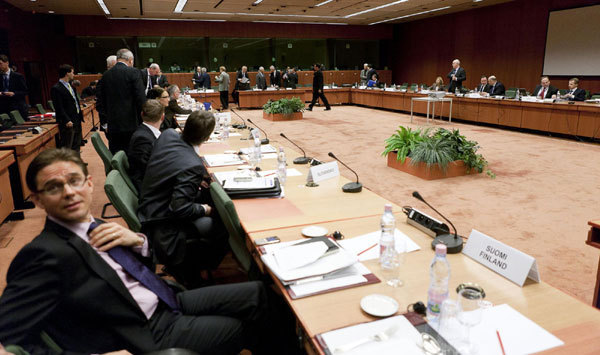Center
Eurozone finance ministers meet to debate expansion of rescue fund
Updated: 2011-01-18 15:31
(Xinhua)
BRUSSELS -- As eurozone finance ministers began their monthly meeting here on Monday, expansion of the rescue fund set up in May last year will continue to be a hot topic.
German Finance Minister Wolfgang Schaeuble said on arrival for the meeting that "there is no need at the moment for an urgent decision" on whether to broaden the 440-billion-euro (580-billion- U.S. dollar) European Financial Stability Facility (EFSF), the lion share of the 750-billion-euro (990-billion-U.S. dollar) rescue fund put together last May by the European Union (EU) and the International Monetary Fund(IMF).
Eurogroup President Jean-Claude Juncker said before the meeting that the ministers won't make any decisions on Monday.
|
|
While Germany, the largest contributor to EFSF, is reluctant to enlarge the rescue fund at the moment, some EU officials have strongly called for increasing the fund during the past week.
President of the European Commission Jose Manuel Barroso told a press conference last Wednesday that the Commission considered that the effective financing capacity of EFSF must be reinforced and the scope of its activities widened.
He called on the EU leaders to take the decision no later than their next summit meeting scheduled for February 4.
European Commissioner for Economic and Monetary Affairs Olli Rehn told reporters that "progress is being made" on the matter but refused to disclose any details.
European Central Bank (ECB) President Jean-Claude Trichet also echoed the call of the European Commission, advocating for the enlargement of the EFSF.
| ||||
Some eurozone member states support the idea of expanding the fund or at least increasing its real lending capacity. Belgium has reportedly suggested doubling the amount of the money.
Spanish Economy Minister Elena Salgado said on arrival for Monday's meeting that "we are supporters of giving it the maximum flexibility. That is to say, even if it is not increased, allowing it to use all the 440 billion euros of capacity it has."
The 440 billion euros of EFSF is not offered directly by eurozone countries, but guaranteed by them to borrow money by issuing bonds on the market.
There has been wide speculation that Portugal will be the next country seeking help from the EU, especially after yields of the country's 10-year government bonds exceeded 7 percent in early January.
But analysts said the successful auction of 1.25-billion-euro ( 1.65-billion-U.S. dollar) government bonds last week by Portugal and strong demand for the bonds of Spain and Italy has bought Europe some time to deal with the debt crisis.
E-paper

Ear We Go
China and the world set to embrace the merciful, peaceful year of rabbit
Preview of the coming issue
Carrefour finds the going tough in China
Maid to Order
Specials

Mysteries written in blood
Historical records and Caucasian features of locals suggest link with Roman Empire.

Winning Charm
Coastal Yantai banks on little things that matter to grow

New rules to hit property market
The State Council launched a new round of measures to rein in property prices.



